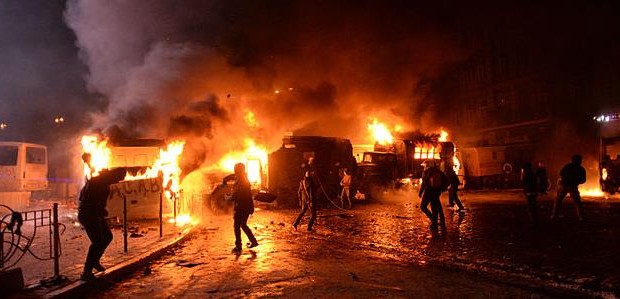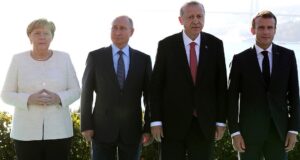Guest Contributors: Timothy Stafford and Laura Dzelzyte
18th March 2014
After more than a decade promoting nonintervention in the internal affairs of other countries, Russia has become the latest convert to the concept of the ‘Responsibility to Protect’, or R2P. The notion, which holds that states have an obligation to protect populations from genocide, war crimes, crimes against humanity, and ethnic cleansing, has become a key justification of the Crimean intervention.
Addressing the situation in Ukraine on 4th March, President Putin outlined his rationale for deploying troops: “What worries the citizens of Ukraine, both Russian and Ukrainian, and the Russian-speaking population in the eastern and southern regions of Ukraine… is this uncontrolled crime. Therefore, if we see such uncontrolled crime spreading to the eastern regions of the country, and if the people ask us for help… we retain the right to use all available means to protect those people.”[1]
Such language is very similar to that used to justify force in Libya, as well as that advanced by advocates of intervention in Syria. So where does the situation in Ukraine fit into the intervention debate? Does Russian reliance upon R2P for its intervention in Ukraine strengthen it as an emerging norm?
Not exactly. In fact, it will probably do the reverse.
For Putin and his circle in the Kremlin, Ukraine seems like a textbook case in which R2P applies. In their view, Kiev has lost its capability to protect its own Russian speaking people and has thereby sacrificed its claim to full sovereignty. Russia, possessing the ability to act in its place, is therefore justified in doing so.
To Western nations, most prominently the United States, that rationale smacks of a smokescreen, given that intervention dovetails with Russia’s longstanding strategic interests. Ukraine represents the frontline of Moscow’s sphere of interest, serving as a buffer between Russia and former Eastern block countries that have now joined NATO. Strengthening its influence there is key to its regional strategy. Moreover, the Crimea-based naval installation at Sevastapol is the most important Russian military base outside the former Soviet Union, enabling direct access to the Mediterranean and beyond. Lastly, intervention serves not only to intimidate the new government in Kiev, but acts as a subtle form of pressuring on post–Soviet countries like Moldova, who might otherwise consider splitting off from the Commonwealth of Independent States (CIS).
To Western officials, Moscow’s action, therefore, represents an effort to hijack R2P, transforming it from a noble principle for protecting populations into a sullied justification for the protection of Russia’s sphere of interest. There is some truth in this claim. Thus far, there is little evidence of oppression of Russian-speaking Ukrainians that would amount to humanitarian crises sufficient to trigger R2P. How then, Western officials ask, is the situation different to that when Yanukovych was deposed in 2004, something that did not prompt Russian military action?
Moreover, de facto annexation of Crimea, now inevitable following this weekend’s referendum in which over 95% voted to join the Russian Federation, also begs a question of where else Russia might assert its interests on the basis of ‘protecting’ Russians. Its actions send concerning signals to many former Soviet countries.
Even the Baltic states, now full members of the EU and NATO, don’t feel immune. Around a quarter of Latvians and Estonians consider themselves ethnic Russians, and with frequent clashes over treatment of these minorities, some there worry that it is only a matter of time before Russia decides to intervene to protect ‘its’ people.
These are all legitimate challenges and concerns. Unfortunately, Western governments are not best placed to make or express them. Russian officials were left fuming by NATO’s assumption that authorisation to protect civilians in Libya was tantamount to a blank cheque to engage in regime change. They are in no mood to be lectured to now.
The emergence of these competing intervention narratives was inevitable, for most interventions are borne out of interest, not altruism. When such interests are lacking, as in Rwanda or Darfur, intervention barely crosses the threshold of consideration. When they are present, states will go to extraordinary lengths to justify them. Therein lies the problem for proponents of R2P.
Until now, the United States and other Western nations have been quite comfortable with the emerging norm. After all, they have tended to be the arbiters of where and when to intervene. Not only was the US the only state with the capability to launch interventions in the post-Cold War era, but a new wave of democratisation convinced it that it was working with the grain of international affairs. Hence, the marshalling of democratisation as an argument in favour of intervening in Kosovo and Iraq.
Yet, it was only a matter of time before R2P escaped the sole preserve of Western nations. By recruiting it into his repertoire of justifications, Putin has finally put to death the pretense of an emerging Post-Cold war consensus.
Must we, therefore, concede that R2P has become little more than a veil for national interests or even retainment and expansion of influence sphere? Could not the West respond to the events in Crimea with an intervention of its own in the rest of the country? After all, aren’t Ukrainians just as much in need of protection from Moscow as Russian-speaking Ukrainians are from Kiev?
Such a move would be most premature. Firstly, it would do little to salvage the R2P principle. Dueling interventions in Ukraine would only muddy the waters much more. Moreover, all interventions have negative unintended consequences, and intervening militarily to support the new government in Kiev, would be no different. Doing so would be to embolden the new government in Kiev, allowing it to adopt maximalist positions that are only like to aggravate Moscow’s ire.
The only argument that speaks in favor of military intervention by the US or EU is the need to buy leverage with the new authorities, leverage which can be used to push it towards a more moderate path. Yet, history shows that it is notoriously difficult to translate external assistance into domestic leverage. India’s severing of East Pakistan in 1971 left it with little leverage in the newly created Bangladesh.
Despite independence for Kosovo not having been an overt aim of NATO’s 1999-intervention, a unilateral declaration to that effect came within a decade. Post-Gaddafi Libya offers another, more recent example. After its concerted effort to support the rebels, what leverage does the US really hold? If the truth is told, remarkably little.
Strengthening Ukraine’s new pro-Western government is in the strategic interest of the West. Upbeat statements about the possibility of EU membership will strengthen the new establishment’s resolve. The extensive financial aid that has already been pledged will go a long way to staving off an economic crisis and insulate Kiev from any Russian attempt to use energy politics as a means of political pressure. Likewise, sanctions against Russian officials, now in place after the Crimean referendum, will raise the cost of any additional Russian efforts to bring the country back within its orbit.
Yet, rather than rushing to defend the new government of Ukraine from all threats, both real and imagined, the US and others should tie its support to the steps Kiev itself takes to reduce tensions. Moving to provide real safeguards for Russian speakers would be a useful start, as would a pledge to ensure genuine representation of the country’s Eastern portions in any future government.
Equally, Western donors should seek to deter any knee-jerk reaction to Crimea’s vote in favor of accession to Russia, for no good can come from an aggressive response. Henry Kissinger was right to note, “Any attempt by one wing of Ukraine to dominate the other… would lead eventually to civil war or break up”.[2] These steps would serve to prevent that outcome.
Timothy Stafford is a Masters Candidate in Security Studies at Georgetown University. He is also a non-resident fellow at Pacific Forum-CSIS, and a former House of Commons Researcher.
Laura Dzelzyte is an independent advisor and commentator on international negotiations, climate and finance. Laura served the Lithuanian government during the Presidency of the EU.
Disclaimer: The views expressed in the article are the sole responsibility of the author and do not necessarily reflect the views of the Human Security Centre.
 Human Security Centre Human Rights and International Security Research
Human Security Centre Human Rights and International Security Research




